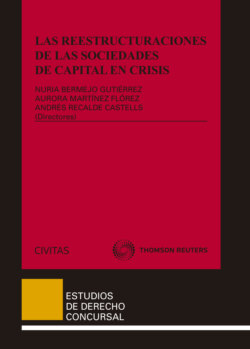Читать книгу Las reestructuraciones de las sociedades de capital en crisis - Aurora Martínez Flórez - Страница 66
На сайте Литреса книга снята с продажи.
VI. NEXT: THE POSSIBILITY FOR SHAREHOLDERS TO AVOID DILUTION OR CANCELLATION OF THEIR PARTICIPATION
ОглавлениеIn addition to the above mentioned considerations, the concern for safeguarding the interests of old shareholder of distressed company39) seems to be unjustified and, as such, unable to ground a restrictive interpretation –pursuant to which company law limits to the exclusion of pre-emptive right are to be applied also in the event of restructuring plan– of the provisions under consideration, as shareholders can recapitalize the company –pursuant to the rules of company law– before and out of the agreement with creditors.
Regarding that, the relationship between directors and shareholders in the company's corporate "twilight" zone is very important.
According to Italian legal system, when the company is in crisis and at least where restructuring plan provides for measures about the legal capital and the position of shareholders, a duty of directors to promptly call shareholders meeting can be grounded, in order to inform shareholders of the situation and to ask for a "ratification" about the planned strategy to overcome the crisis. Such a duty has the specific function to enable shareholders to intervene actively to overcome the vicinity of insolvency, providing, for ex., new financial resources40): they can choose whether to continue with the restructuring plan drafted by the directors –which could also cover the ablative measures on corporate shareholders position– or even to remove directors if they disagree the choices of the latter or to wind up the company41) - 42). This reconstruction is true also for foreign legal systems, where we can point out the trend toward shareholders involvement at least in managing decisions when a crisis exists and the restructuring plan can affect their position, as well as the structure of the company43).
If shareholders have not taken any action during this "first round"44), recapitalizing the company or replacing the directors –and therefore they have not taken advantage of the opportunity to avoid ex ante the commencement of a procedure–, there is no reason why their interest to take part to "re-negotiation" on the company's financial structure should be preserved after the commencement of the agreement of creditors45).
In this context, moreover, a rule pursuant to which the interests of old shareholders to remain in the company or not to suffer dilution of their participation can be laid down matches with other insolvency rules, the rationale of which can be held the change of the property of the company, as the old shareholders have caused –at least selecting the directors– the onset of the crisis. Consider, in particular, art. 182 quater, paragraph 3, 2nd sentence, l.b.l. (and art. 102, paragraph 2, I crisis c. after August 2020), granting a preferential right to be satisfied to those who have acquired a social participation in execution of the agreement with creditors or of the restructuring agreement, as well as, to a comparative level, § 39 Abs. 4, Inso 46).
